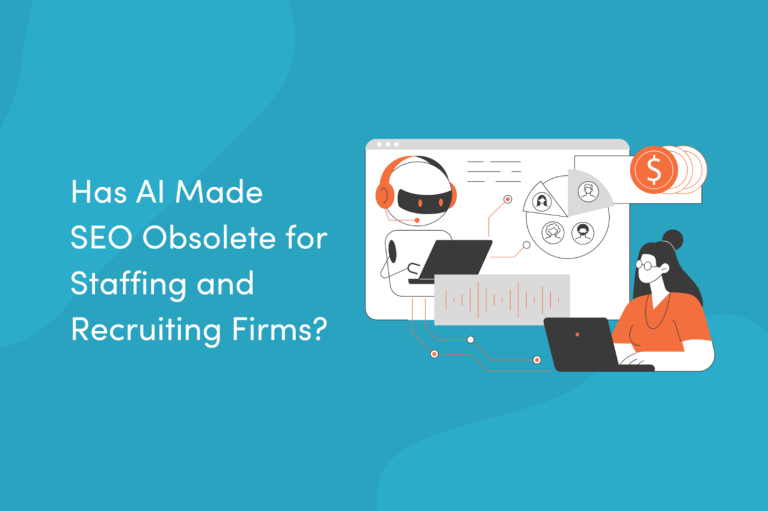This blog was provided to TechServe by our Supplier Member, echogravity. View the original blog here.
For staffing and recruiting firms, the SEO game has changed. It’s no longer just about ranking on Google for a few high-volume keywords. Now, your brand needs to show up in answers, the kind generated by tools like ChatGPT, Bing Copilot, Claude, Google Gemini, and more.
Your clients and candidates aren’t typing in simple keyword searches anymore. They’re asking questions, looking for summaries, and expecting intelligent, synthesized responses. And if your content isn’t optimized to be part of those answers, you’re invisible.
So no, SEO isn’t obsolete. But it is evolving. Fast.
Let’s dive in on what that means, and how your staffing and recruiting firm can stay visible in both traditional and AI-powered search within the staffing and recruiting industry. If anything, AI is making SEO more important, and more sophisticated.
Let’s Get Definitions Out of the Way
First things first. When we talk about SEO, we’re referring to the decades-old practice of search engine optimization. That means crafting your website’s structure, content, and meta information to achieve maximum visibility in search engines like Google and Bing. Traditional SEO relies heavily on:
- Keyword usage
- Domain authority
- Page speed
- Internal linking
- Backlinks
But now we have a new player: AI-powered search.
Unlike keyword- or key phrase-only engines, AI search tools like ChatGPT, Perplexity, Bing Copilot, and Gemini go beyond terms and phrases. They understand user intent, natural language, and semantic relevance. These tools generate synthesized responses using context, relationships between entities, and language models trained on millions of documents.
From a business standpoint, the goal isn’t about ranking for a term; it’s about being the source of an answer.
The Shift Is Already Happening
Google still dominates search behavior. But that dominance is starting to shift.
A 2024 study sponsored by the U.S. Census Bureau and the Bureau of Labor Statistics found that:
- 40 percent of people in the U.S. have used generative AI
- 24 percent use it weekly
- By 2027, 90 million people are anticipated to prefer AI tools as their first choice for search
So, the smart play is to prepare for today and tomorrow.
Our position at echogravity is that core concepts like search intent that have been in play since the earliest days of online marketing are still relevant. Your content needs to:
- Focus on the needs of your target audience (i.e. What are they seeking? How can you provide information to their questions as well as essential services?)
SEO and AI Search Are More Alike Than You Think
Despite the panic in some corners of the marketing world, the core of what makes good SEO hasn’t changed. Serve the audience well. Answer their questions. Be helpful and trustworthy.
That’s just as true in an AI world as it is in Google’s algorithm.
What’s different is how those questions are being asked and how those answers are being selected. Your content has to reflect not just what your audience is searching for, but how and where they’re doing it.
Instead of typing “IT staffing firm Chicago,” someone might ask ChatGPT:
“What’s the best IT staffing agency in the Midwest that can place contract developers fast?”
That’s not just a keyword. It’s a full prompt. And if your content isn’t optimized for that kind of query, you’re invisible.
Audit Your Content with an Eye on AI
Not sure where to start? Here’s a guide on how to audit your staffing website for visibility and lead generation.
One place to start… bring back the long-tail mindset. A few years back, you may recall your marketing agency or marketing team obsessed over long-tail keywords? That concept is back with a twist.
Today, instead of just targeting niche phrases, we’re optimizing for natural language questions and conversational queries. That’s how users talk to AI.
Your content should include direct Q&A formats that mirror how real people ask for help. Focus on key areas of your site:
- FAQs
- Service pages
- Case studies
- Blog posts
- Homepage sections
Common questions your audience might be asking include:
- What’s the ROI of using a staffing agency vs. in-house hiring?
- How long does it take a staffing agency to fill a role?
- Can a staffing firm provide pre-vetted candidates?
- How do staffing agencies handle compliance and background checks?
If these aren’t already present, you’re leaving visibility on the table.
Where Technical SEO Meets AI Optimization
To bridge the gap between traditional SEO and AI visibility, implement updates that speak both languages.
Add Structured Data (Schema Markup)
Structured data helps you tell both search engines and AI what your content is about. It’s a foundation for rich snippets and AI interpretation.
Prioritize adding:
- FAQ Page schema for Q&A sections
- Organization, LocalBusiness, and Article schema
- JobPosting schema if you post openings
- WebPage, Breadcrumb, and Review schema where appropriate
Turn to your marketing agency for help here, and there are tools like Yoast that make implementation manageable.
Optimize for Semantic Relevance
AI models connect entities and concepts rather than just matching keywords.
Use semantic keyword clusters around your core services.
For example, instead of only repeating “sales staffing agency,” add context through phrases like:
- SDR hiring
- On-demand sales talent
- Ramp-up staffing for new markets
- Hiring contract reps for sales pilots
- Reducing time to productivity for sales hires
Design for Answer Extraction
AI tools and Google both favor content that’s easy to parse and summarize.
Use these techniques:
- Place key questions in H2s or H3s
- Write clear, 2–3 sentence answers
- Format key points as bullet lists
- Add TLDR or summary boxes at the top of important pages
This makes your content easier for AI to extract, and it improves the user experience for human visitors.
Build Topical Authority
Both traditional search engines and AI reward depth and relevance. If your firm specializes in logistics staffing, build out content clusters like:
- A logistics staffing services page
- A blog on reducing warehouse turnover
- A case study showing how you cut time-to-fill
- An FAQ about workforce availability in key regions
- A guide to compliance and safety certifications
Link these pieces together to strengthen both SEO and topical trust.
Strengthen Backlinks and Engagement Signals
AI search engines don’t just analyze what you publish. They also assess your content’s credibility based on third-party validation and engagement.
Focus on:
- Getting backlinks from authoritative industry sites
- Listing your agency on directories like Clutch, UpCity, and SIA
- Maintaining a complete, verified Google Business Profile
- Earning and showcasing reviews and testimonials
- Take the time to review the backlinks in your content:
- Is it still active? (You’d be surprised how many 404 errors you might find.)
- Is it still timely? (Is there a more recent/updated link that would be more valuable?)
- Is the authority of the linked site valuable?
These efforts help you rank better and improve your chances of appearing in AI-generated results.
AI + SEO: The Thought Leadership Advantage
We are content marketers after all, so it probably comes as no surprise that, in our opinion, quality content is the most straightforward path to differentiating your staffing business.
Content marketing has always been about producing content that, first and foremost, serves your audience by delivering something of value – and then ensuring that content is optimized for search. In other words, create quality content first, then add the SEO juice to your marketing elixir.
It was never about coming up with a list of keywords and then trying to tie them together into a coherent thought. That commitment to quality is more important than ever. Generative AI is looking for thought leadership and case studies to draw upon. Again, this is where SEO and AI search play nicely together.
Generative AI doesn’t “scrape” content in the traditional sense but instead indexes, interprets, and synthesizes information from various sources, including blog posts and case studies. Your marketing team is going to ensure that your published content is optimized for traditional search (still the king, remember) but you can also optimize for AI. Instead of just reading keywords, AI analyzes context, intent, and structure to understand the meaning behind the text.
Content that performs well in both includes:
- Authoritative blogs that answer common client queries with clarity, stats, and structure
- Case studies that show your impact with clear outcomes and metrics
- Industry commentary and well-researched insights
- Client testimonials and use-case narratives
- Clean formatting with organized headings and logical flow
AI doesn’t scrape content the way traditional bots do. It interprets context and meaning. That means fluff, keyword-stuffing, and vague claims won’t get you far.
A Final Thought. SEO Isn’t Dead. It’s Just Sharing the Limelight.
If you’re running a staffing or recruiting firm, SEO still matters. But it’s no longer just about keywords and rankings. You need to prepare for a world where AI is shaping how buyers discover, evaluate, and engage with agencies like yours.
The smart move is to build content and structure that works in both environments. Be the answer someone gets whether they type a question into Google or ask ChatGPT for a recommendation.
We’re already seeing our clients generate qualified leads coming from AI. If you want to get ahead of the curve, future-proof your content, and make your brand discoverable in any search format, let’s talk.












